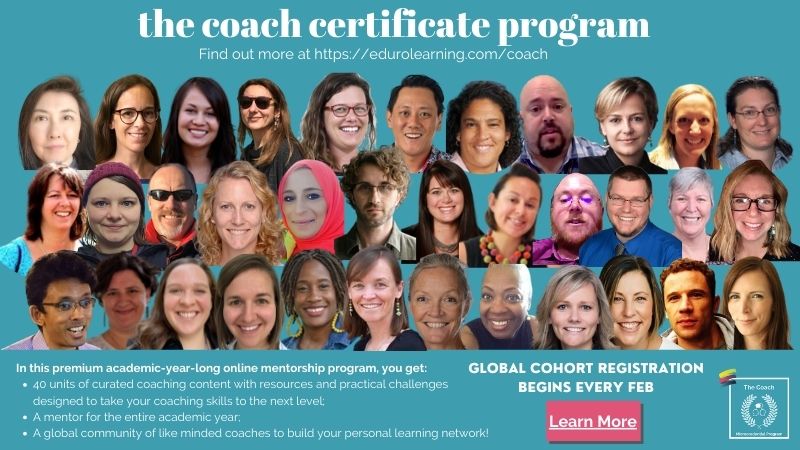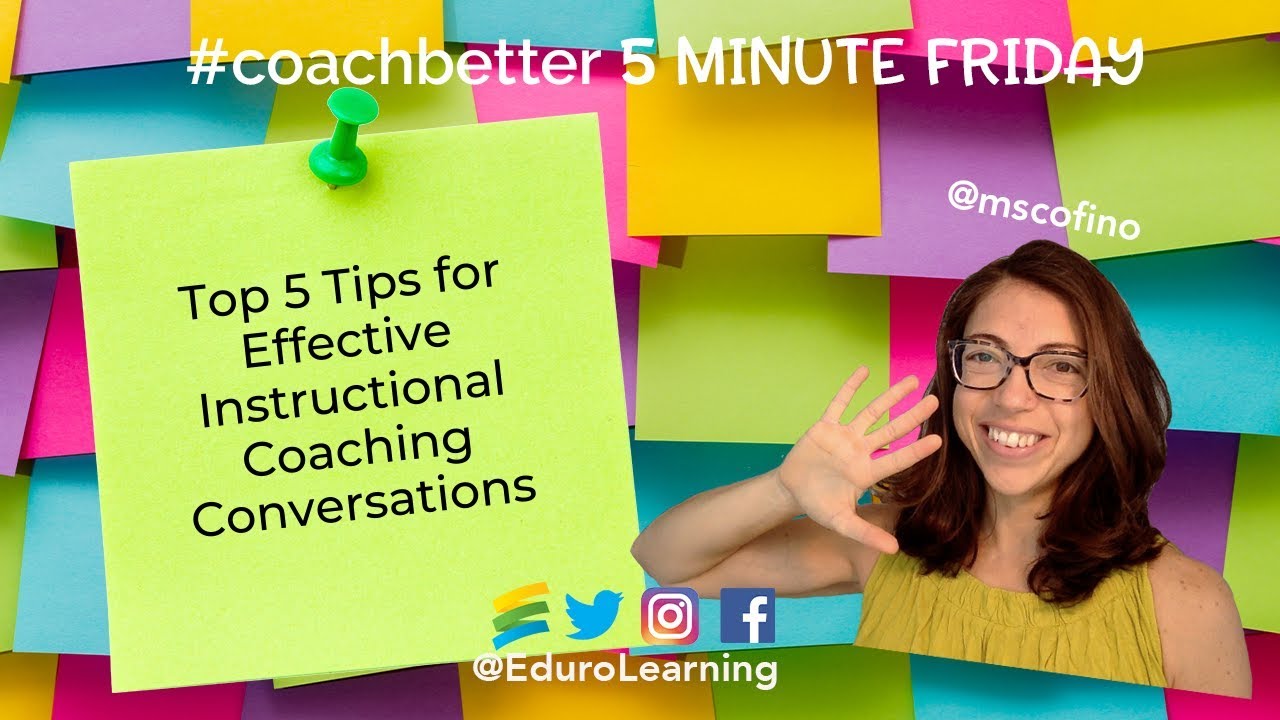As all coaches know, the coaching conversation is the cornerstone to our work with our colleagues. So that means we want to make sure each and every conversation is the best it can be!
No matter how many coaching conversations you’ve had, there are always opportunities to improve and refine your coaching practice.
As we look back at the many coaching conversations we’ve had, we have identified our top 5 most important elements that we think are essential for every conversation. Read them below and then let us know – do you agree? Are these your top five? Or would you put something else on the list before one of these items?
Our Top 5 Strategies for an Effective Coaching Conversation
1. Personalize the Coaching Experience
Perhaps the most important tip today. Once size doesn’t fit all in a coaching relationship. It’s not a conveyor belt where teachers walk through your office and you conduct the same meeting again and again but with different people each time. Every conversation, every collaboration needs to be customized for each teacher.
As experienced teachers, we all know how much teachers have to prep for each class and we have to prep as coaches too! As we mentioned in our last blog post, part of this prep is getting to know each teacher individually, and getting to know them so well that you can almost anticipate their needs, as Carrie Zimmer mentions in our recent #coachbetter episode.
To make this happen, you will likely have to do some pre-planning and pre-thinking about how this conversation could be personalized for this teacher. If you know they love stopping for coffee, suggest a meeting over coffee. If you know they’re stretched extra thin, make sure you make the meeting time and location convenient for them and be very focused with your time management during the meeting. If you know they prefer to get away from their classroom for a meeting to be able to focus, invite them to your space or a shared space like the library. Ultimately, every conversation shouldn’t be exactly the same. The more you put into it, the more you get out of it.
We don’t want our coaching conversations to feel like an assembly line. We do want our teaching colleagues to feel respected, valued and understood. We can do that by prepping for each meeting, so that the teacher feels like you really thought about them as an individual. Ideally we want them to have that moment of “yes! My coach understands me and my needs!” every time you meet.
2. Determine Outcomes for the Conversation
The role of the instructional coach can be different in different schools, and many teachers have worked with a variety of coaches in their careers. This means that there are many different interpretations of exactly what coaches do. To make sure that both you and the teacher are on the same page, it’s important to set the groundwork for your conversation.
There are a couple of elements that might be worth clarifying, including:
- What are the teachers goals? What are the teacher’s expectations? What does the teacher hope to get out of this experience?
- What are the expected learning outcomes for the students?
- What will each of you (coach and teacher) actually do during your work together?
- What kind of outcomes can we expect from this experience?
- What feedback would the teacher like? How can the teacher give feedback to the coach?
It’s a good idea to make sure you’re both on the same page before realizing later that you and the teacher had different ideas about where the conversation was going to go.
Good questions to ask set the groundwork for the conversation include:
- What goals do you have for our work together?
- What do students need to know and be able to do?
- What is the desired outcome of this conversation?
- Are we on the same page?
What’s YOUR level of coaching mastery?
All coaches go through various stages of coaching mastery. Once you identify where you’re at, you can begin to build the skills needed to move to the next stage.
This quiz is based on real-life case studies compiled from years of working with coaches inside The Coach Certificate & Mentorship Program!
When you receive your results, you’ll also get your matching case study from the STRIVE Case Studies to see where you fit in the stages of coaching mastery.
Ready to tackle your challenges and move on to the next level in YOUR coaching practice?

The STRIVE Model of Coaching Mastery quiz will help you identify your level of coaching mastery by matching you with case studies compiled from years of working with coaches inside The Coach Certificate & Mentorship Program so you can easily see where you fit!
When you complete the quiz, you’ll get:
- Your matching case study,
- Specific strengths & challenges aligned to your result;
- Suggested next steps for each stage;
Plus the Case Study Document includes:
- Case studies leveled by coaching mastery;
- A framework to identify essential stages of professional growth & key areas to focus on in your professional learning;
- Alignment with the THRIVE Model for a Successful Coaching Culture;
- Space for you to reflect & prioritize so you can take action immediately!
You’ll go straight to the Quiz, and get the Case Study Document via email.
3. Listen More Than You Talk
To have an effective coaching conversation, it’s important to allow the teacher to be the focus. This means we have to listen more than we talk. It can be difficult sometimes to not jump in and offer advice or suggest a solution or strategy, but it’s more important to get a better understanding both of what the teacher needs and what kinds of solutions they already have from their own experience.
A majority of your coaching conversation should be listening to the person you’re working with. To help stay focused (and to clarify) on what the teacher is saying (rather than listening to the voice in your own head or thinking about what you might want to say next), you can try paraphrasing what the teacher has said before continuing your conversation.
As you listen, you might also consider asking some questions like:
- What makes you say that?
- Can you tell me more about that experience?
- How did that experience impact student learning?
- Do you have any thoughts about what you might like to do next?
4. It’s Not About Fixing a Problem
One of the key ways coaching can fail is if we view our role as fixing the teacher. That’s not what coaching is about. Coaching is about understanding a teachers needs and goals and walking the path with them to take their next steps.
Therefore, one of the aspects of having a successful coaching conversation and relationship with a teacher relies on that person knowing you’re not evaluating them. This is important to help encourage further conversations with teachers. It can be hard to remember in the moment, when you are so enthusiastic about what a teacher is sharing, but even positive feedback, such as “great idea,” is still evaluating their progress. Try using non-evaluative language as much as possible by focusing on student learning outcomes.
Along these lines, a great way to ensure you’re not evaluating and to help empower the teachers you work with, you can promote a growth mindset, by using phrases like:
- It’s clear how much time and effort you’ve put into this.
- What strategies have you tried? What other strategies might work?
- What did you learn from this experience?
- Is there another way we could try this?
- It’s clear you are committed to making this work.
5. Closure / Next Steps
One of my personal pet peeves is when, at the end of a meeting, there is no closure or follow up. It can feel like you just spent a solid chunk of time with no tangible outcomes or actions – and even worse, you are usually thinking about all the other things you could have done with your time. Don’t let that happen to the teachers you coach!
At this time, it’s also nice to take just a moment to allow the teacher to reflect on the conversation. To help them recognize and articulate that the time spent in a coaching conversation was valuable for them. You can ask simple questions like:
At the end of each meeting, make sure to take a few minutes for closure and setting next steps. Usually this means that both the teacher and the coach have action items based on the day’s conversation. This is also gives you a perfect opportunity to set the next meeting – to follow up on these tasks. Plus, it gives you a clear focus for your next meeting too!
- What was the most useful for you? Out of this conversation, what was the most useful thing that we talked about?
- How are you feeling about today’s conversation? Are you ready for the next step?
- Is there anything you’d like to change for our next meeting?
Final Thoughts
What are your top strategies for a successful coaching conversation? Is there something you would add to this list?
If you like these tips, make sure to check out our #coachbetter podcast and Facebook group.
Watch the Video
Level Up Your Coaching with The Coach!
If you are ready to develop your coaching practice over the next academic year, and explore topics like transitioning your work from individuals to teams, please join us for our next cohort of The Coach!
Wherever you are in building a coaching culture in your school, The Coach will give you the strategies, skills and tools you need to make coaching a success and will empower you to confidently apply instructional coaching strategies in any situation – from building a coaching program, to having coaching conversations, to being a leader in your school community. We facilitate only one cohort each academic year so we can offer individualized support for each participant.
Registration for our next global cohort opens once a year – check the website for details!

Find out more at: https://edurolearning.com/coach/

Recent Comments